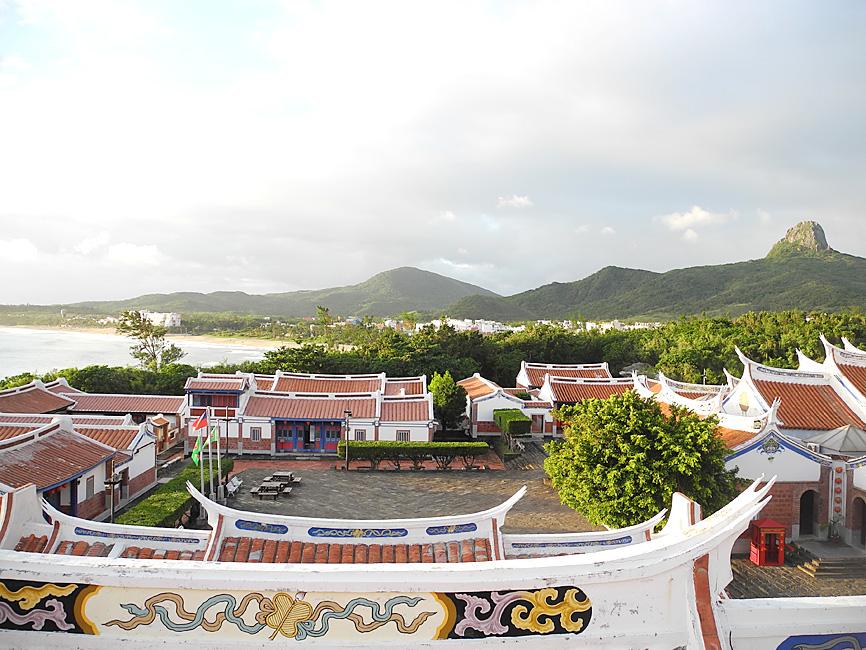The Ill-gotten Party Assets Settlement Committee yesterday moved to nationalize 61 properties worth about NT$1.39 billion (US$46.5 million), saying that the China Youth Corps had unlawfully obtained them in the Martial Law era.
The corps must also pay an estimated NT$240.57 million in compensation on properties that had been sold to a third party and could not be returned to their rightful owners, committee Chairman Lin Feng-jeng (林?正) told a news conference in Taipei.
The properties being nationalized included 2,842m2 of land and structures with 19,615m2 of floor space, Lin said.

Photo: Tsai Tsung-hsien, Taipei Times
The assets the committee are to seize encompass guesthouses servicing national parks throughout Taiwan branded “youth activity centers,” including those at Sun Moon Lake (日月潭), Alishan (阿里山) and Kenting (墾丁).
They also include Kuan Yun Youth Hostel in Taroko National Park and other youth hostels branded “life-long learning centers” and “academies” in Chiayi and Taitung counties, the committee said.
The seizure orders were to be delivered to the corps by the end of yesterday and the properties must be either handed to the state within 30 days or foreclosed, he said.
The regulations governing public land might allow the hostels to remain open, but the matter is up to officials administrating public land, he said.
The corps during the Martial Law era was seen as a harmless group overseeing student recreational activities, but it was secretly conducting surveillance on university campuses nationwide, committee Deputy Chairman Sun Pin (孫斌) said.
Spying extended to students studying overseas via the corps’ international offices, he said.
The corps’ job was to indoctrinate young people through their participation in the organization’s activities, recruit new blood for the Chinese Nationalist Party (KMT) and act as an antidote to student protests, he said.
Corps secretariat director Cheng Fei-wen (鄭斐文) criticized the committee, saying it had reneged on a deal they had struck and that the seizures would jeopardize the livelihoods of hostel employees.
The corps would fight the committee’s decision in court, he said.
“We negotiated with the committee eight times honestly and in good faith,” Cheng said. “It felt like a betrayal when the committee suddenly called a news conference to seize [the corps’] assets.”
The corps would hold a news conference after reviewing the committee’s legal documents, he said.
Additional reporting by CNA

Alain Robert, known as the "French Spider-Man," praised Alex Honnold as exceptionally well-prepared after the US climber completed a free solo ascent of Taipei 101 yesterday. Robert said Honnold's ascent of the 508m-tall skyscraper in just more than one-and-a-half hours without using safety ropes or equipment was a remarkable achievement. "This is my life," he said in an interview conducted in French, adding that he liked the feeling of being "on the edge of danger." The 63-year-old Frenchman climbed Taipei 101 using ropes in December 2004, taking about four hours to reach the top. On a one-to-10 scale of difficulty, Robert said Taipei 101

Nipah virus infection is to be officially listed as a category 5 notifiable infectious disease in Taiwan in March, while clinical treatment guidelines are being formulated, the Centers for Disease Control (CDC) said yesterday. With Nipah infections being reported in other countries and considering its relatively high fatality rate, the centers on Jan. 16 announced that it would be listed as a notifiable infectious disease to bolster the nation’s systematic early warning system and increase public awareness, the CDC said. Bangladesh reported four fatal cases last year in separate districts, with three linked to raw date palm sap consumption, CDC Epidemic Intelligence

US climber Alex Honnold left Taiwan this morning a day after completing a free-solo ascent of Taipei 101, a feat that drew cheers from onlookers and gained widespread international attention. Honnold yesterday scaled the 101-story skyscraper without a rope or safety harness. The climb — the highest urban free-solo ascent ever attempted — took just more than 90 minutes and was streamed live on Netflix. It was covered by major international news outlets including CNN, the New York Times, the Guardian and the Wall Street Journal. As Honnold prepared to leave Taiwan today, he attracted a crowd when he and his wife, Sanni,

Taiwanese and US defense groups are collaborating to introduce deployable, semi-autonomous manufacturing systems for drones and components in a boost to the nation’s supply chain resilience. Taiwan’s G-Tech Optroelectronics Corp subsidiary GTOC and the US’ Aerkomm Inc on Friday announced an agreement with fellow US-based Firestorm Lab to adopt the latter’s xCell, a technology featuring 3D printers fitted in 6.1m container units. The systems enable aerial platforms and parts to be produced in high volumes from dispersed nodes capable of rapid redeployment, to minimize the risk of enemy strikes and to meet field requirements, they said. Firestorm chief technology officer Ian Muceus said